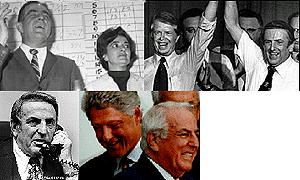
The University of Chicago Magazine
August 1996



Continuation of "Dissenting Opinion"
Regular Democratic headquarters, looking to volunteer for duty. This was suspect behavior.
"Who sent you?" the ward committeeman asked him.
"Nobody," Mikva answered.
"We don't want nobody nobody sent. We ain't got no jobs," the committeeman told him.
Mikva told him he wasn't looking for a job. This was even more suspect.
"We don't want nobody that don't want a job. Where are you from, anyway?"
"The University of Chicago," Mikva told him.
"We don't want nobody from the University of Chicago in this organization."
Thus ended Mikva's career as a cog in the Democratic machine.
Born and raised in Milwaukee, Mikva graduated cum laude and Phi Beta Kappa in 1951 from the Law School, where he edited the Law Review and was named to the Order of the Coif. He clerked for Supreme Court Justice Sherman Minton, then returned to Chicago to practice labor law in the firm of the late Supreme Court Justice Arthur Goldberg.
He had the political bug, though. In 1956 he ran for the Illinois House against the Democratic organization and was, amazingly enough, elected, the first independent Democrat from Chicago in the legislature. Mayor Richard J. Daley's forces tried to freeze him out. They wouldn't let him pass any bills in the first year, but he quickly became known as a crusader, pointing to corruption in the state welfare system and lobbying for open-housing laws. He made enough of a splash to be named "Best Freshman Legislator" by the reporters in Springfield. Later in his Springfield career, he authored comprehensive reforms of the state mental-health and criminal codes.
"We were known as the Kosher Nostra," says Illinois Appellate Court Justice Anthony Scariano, who shared an apartment with Mikva and longtime U.S. Senator Paul Simon when all three were young state legislators. "Most of our guys were Jewish, and I guess I was the only one who could lay claim to the Nostra part."
The roommates made an odd trio: Simon a teetotaler who stayed up late into the night clacking away on his manual typewriter; Scariano and Mikva, well, they liked to have a good time--sometimes at Simon's expense:
"We went down to Paul's hometown one time and Tony couldn't resist," Mikva recalls. "He goes into the local bar and says out loud, 'We're staying with Paul Simon and we want some booze!'"
Mikva had an up and, mostly, down relationship with Chicago's boss. Daley helped 83-year-old U.S. Representative Barrett O'Hara stave off a Mikva challenge in 1966, but two years later the Daley machine dumped O'Hara and helped launch Mikva to Congress.
"Ab was gutsy and did his homework," says Simon, who retired from the U.S. Senate this year. "And Daley respected those of us who were not in agreement with him. It was a grudging respect, but it was respect."
As Mikva became more outspoken on issues that bedeviled Daley, such as open-housing laws and the mayhem of the 1968 Democratic Convention, the mayor and his machine became outright hostile to the congressman. Whatever shaky understanding Mikva had with Daley was quashed in the convention chaos.
"That was the most awful political experience I've ever had," Mikva says. "The convention itself, the bloodshed, the violence, the anger, the breakdown of institutions--everything went wrong, including our police department.
"All the things that made Daley successful started to crumble. It made me aware what a thin veneer our civility has, and probably prepared me for some of the incivility that goes on now."
When Mikva steps foot in Chicago's United Center in August, it will mark the first time he has come to the Democratic Convention since 1968.
In 1971, with Daley's quiet approval, House Republicans redrew congressional boundaries to throw Mikva into a losing contest with popular representative Ralph Metcalfe. Squeezed out of a political future on the South Side, Mikva headed for Evanston and an open congressional seat.
That 1972 race--in which Mikva lost to Republican attorney Sam Young--set the stage for some of the most memorable political campaigns in Illinois history. Mikva challenged
Continue reading "Dissenting Opinion"
Go to:
- INVESTIGATIONS
- CHICAGO JOURNAL
- EVENTS
- LETTERS
- CHICAGOPHILE
- Feature story, a profile of George Gruhn, AB'67, "Would you buy a used guitar from this man?"
- Feature story, drawings from Reunion 1996 in June, "Scenes from a Reunion"
- Feature story, a profile of Abner Mikva, JD'51, "Dissenting Opinion"
- CLASS NEWS
- DEATHS
- BOOKS
- IN THE CLUBS
- ALUMNI AWARD-WINNERS
